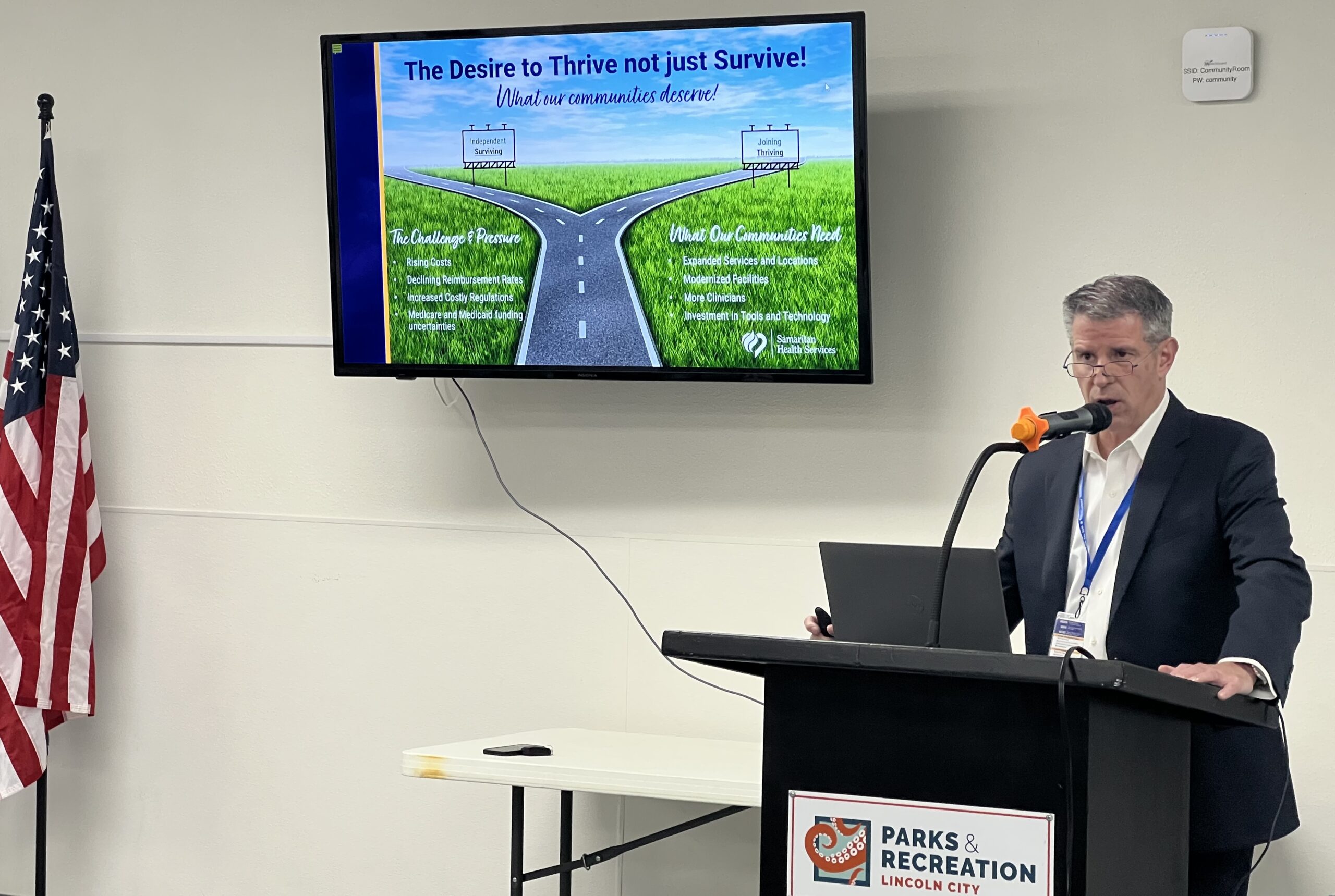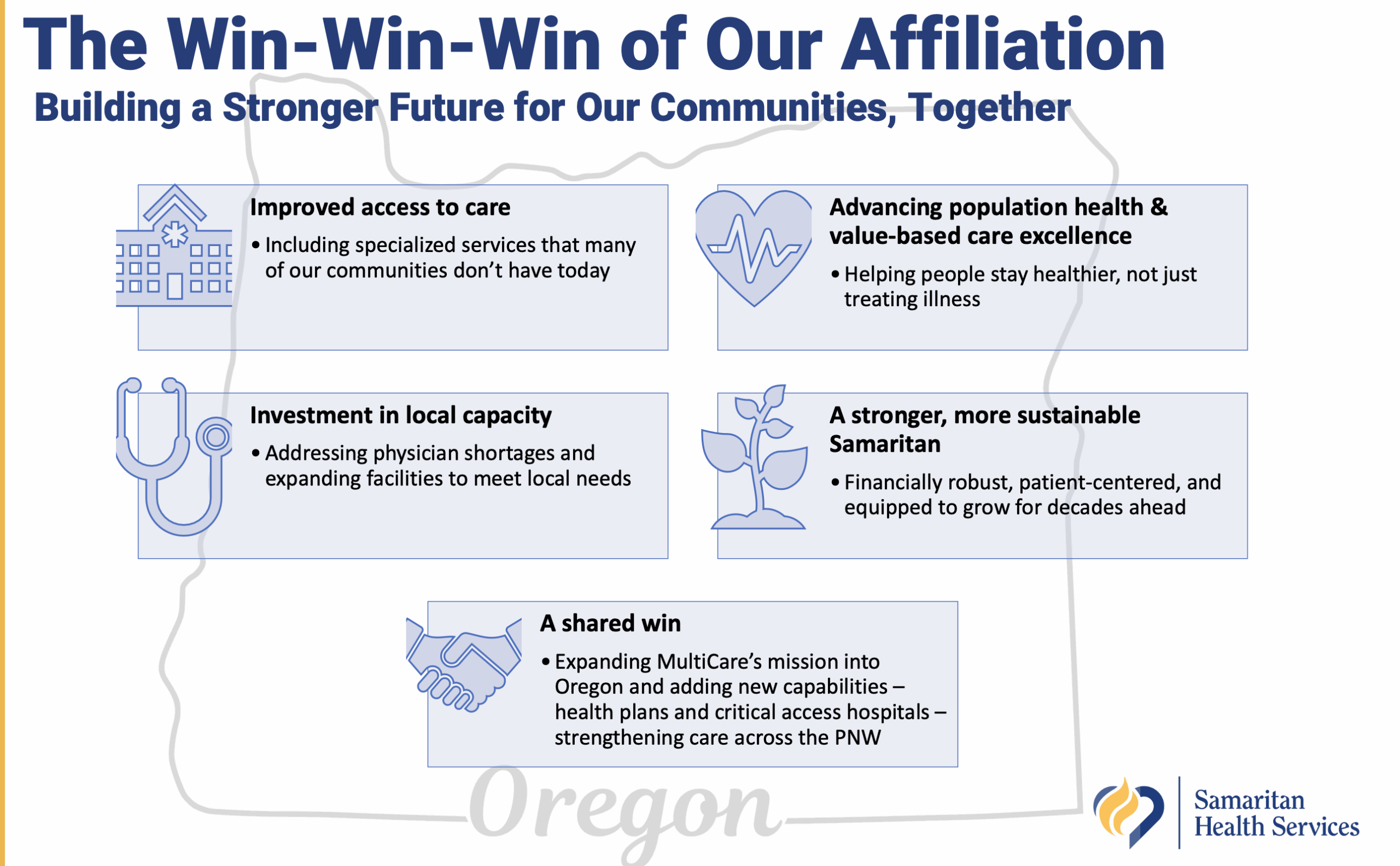
By QUINTON SMITH/Lincoln Chronicle
The dominant healthcare provider in Lincoln, Benton and Linn counties is hemorrhaging money and in order to save itself without cutting its way to profitability had to find a larger, more robust partner.
So Samaritan Health Services hired a merger and acquisitions company which quietly put the 29-year-old nonprofit out for potential suitors to come calling, president and chief executive officer Marty Cahill told a public meeting in Lincoln City on Monday night.
Thirty-eight healthcare systems expressed interest, Cahill said, 17 signed non-disclosure agreements to receive Samaritan’s financials, seven offered proposals and those were whittled down to four. In the end, the Samaritan board and top executives selected two to come “take a look at us and we’d do the reverse,” he said.
The best fit, Cahill said, was MultiCare Health System, which is based in Tacoma but has hospitals and clinics stretching from Spokane to the Washington coast. Samaritan announced their merger plans last month but the deal still needs approval next year from Oregon health care regulators.
Cahill’s one-hour presentation Monday night marked the third of six he is holding in Samaritan’s service areas to explain why it needs help from a larger partner.
Samaritan lost $67 million in 2024, he said, and continues to face headwinds of declining insurance reimbursements and significant cost increases — and could not keep cutting budgets without further impacting medical care.
“We’re in a strong position, but we can’t have too many more $67 million losses without affecting the quality of care,” Cahill told an audience of 75.
Cahill said Samaritan’s 14-member citizen board created objectives for any potential merger: strengthen its role a trusted medical provider and employer; expand access, improve quality and promote health equity; maintain local governance and community-based decision-making; find a strong cultural and strategic fit; and, find the money necessary to modernize facilities to support growth.
In a handout at the meeting, Cahill called the merger with Multicare “… an ideal partnership. From our first conversations, it was clear that our missions and cultures align closely.”

MultiCare’s expansion goals
Samaritan has more than 5,000 employees, including 620 clinicians in its three-county service area. In Lincoln County, Samaritan employs 841 people, has standalone hospitals in Newport and Lincoln City and clinics in Newport, Lincoln City, Depoe Bay, Waldport and Toledo.
MultiCare Health is also a nonprofit but much larger with 25,000 employees, 13 hospitals in Washington and more than 300 clinic and urgent care locations. It is opening a $450 million children’s hospital in Tulalip, Wash.
Cahill said 350 Samaritan managers met with MultiCare executives last week, followed by a retreat with 120 foundation board members from various areas of both organizations.
Cahill says MultiCare’s merger with Samaritan is that organization’s first foray into Oregon, but that it has intentions to expand farther into the state and Idaho.
“They want to, in the next five years, take care of one-third of the population in the Northwest,” Cahill said. “Samaritan was the opportunity they were looking for in Oregon.”
With the merger, Cahill said MultiCare has committed to spending $700 million in capital projects over the next 10 years “to strengthen our services.” Much of that, he told the Lincoln City audience, will be a major expansion of its Good Samaritan Regional Medical Center in Corvallis and at its hospital in Albany. It is those two operations – the largest in its five-hospital chain – that are losing the most money. Operations in Newport, Lincoln City and Lebanon, he said, are profitable and have helped stem deeper losses in Corvallis and Albany.
Because its coastal hospitals are new, he said, the most visible capital project locally will likely be to build a pharmacy on the grounds of Samaritan Pacific Communities Hospital in Newport and to construct a medical office building on the Samaritan North Lincoln Hospital campus.
“They want us to continue to be the system of choice,” Cahill said.

Questions & Answers
Here are some questions and answers from Monday’s session, paraphrased for brevity:

Question: Will Dr. Lesley Ogden continue to be the chief executive officer of the two coastal hospitals?
Cahill: Yes (with emphasis to applause)
Q: MultiCare is in AARP’s United Healthcare insurance program; Samaritan is not. Will that change?
C: There “will be conversations” but Samaritan will eventually be under the same insurance programs that MultiCare accepts. But MultiCare does not offer its own insurance or Advantage plans and is not likely to add them because the shift is increasingly to national insurance providers.
Q: Will this affiliation help attract more medical personnel, including specialists, to the coast?
C: Every organization is struggling to find all types of medical personnel and recruiting heavily, which can be aided by strong and open community engagement. “There are just not enough people to share. Specialists who were on the coast 15 years ago just don’t exist anymore. Now they can work wherever they want to work. Do they want to live in a small community on the ocean or work in downtown Portland or Los Angeles?”
Ogden: It is increasingly hard to attract enough medical personnel, not just doctors and nurses. “We knew we were going to have a physician shortage and a nursing shortage (by 2030). Then the pandemic hit and they left early. We have to find out how to win (recruiting) even if it means someone else losing. We have to win at this. We have to.”
Q: What will governance look like?
C: Samaritan’s operations in Oregon will be one of four regions in the MultiCare system and Samaritan’s president/CEQ will report to the MultiCare president/CEO. One Samaritan board member will join the MultiCare board. The two local health district boards in Lincoln County will remain intact.
Q: Will MultiCare wipe out the voter-approved bonded debt used to build the Newport hospital.
C: No; that bond will remain.
Q: Are the two coastal hospitals profitable?
C: Hospitals in Newport and Lincoln City “are doing well. They’re profitable … but if you put them by themselves, they fail. Critical access hospitals are in the sweet spot of finances.”
Newport meeting Dec. 1
Registration is requested for upcoming meetings. To register or learn more, visit samhealth.org/Affiliation.
The Newport session Monday, Dec. 1, 5:30-6:30 p.m., Samaritan Center for Health Education, 740 S.W. Ninth St.
Other remaining meetings are:
- Albany: Monday, Nov. 24, 5:30-6:30 p.m., Samaritan Albany General Hospital, 1046 Sixth Ave. S.W., Albany; and
- Online: Thursday, Dec. 11, noon to 1 p.m.: A virtual forum via Microsoft Teams. A link will be provided upon registration and recording will available at samhealth.org/Affiliation after the event.
- Quinton Smith is the editor of Lincoln Chronicle and can be reached at YachatsNews@gmail.com




















As a long-time Samaritan employee, it’s hard to believe anything the CEQ says. Thank the heavens Leslie is still with Samaritan. A brilliant woman, doctor and leader.
I will be asking this question at one of the meetings: I support local businesses. That includes local pharmacies, medical equipment suppliers, etc. This is a big step for Samaritan and nowhere am I reading about whether and how Samaritan will continue supporting communities. For example, constructing a pharmacy in the grounds of the Pacific Communities Hospital in Newport. Have you considered how will that affect the existing pharmacies in the area?